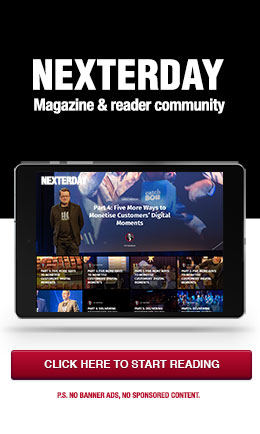TM Forum Live! 2015 Recap: 3 Key Takeaways on Telco Digital Transformation
Posted: June 9th, 2015 | Author: Steve Hateley | Filed under: Events | Tags: customer experience, innovation, telecoms, TM Forum Live! | 1 Comment »Comptel was in Nice, France for TM Forum Live!, where the discussion surrounded the innovative technology, emerging consumer trends and unique businesses challenges that face the digital and communications industry now and in the coming years.
The event’s overarching theme involved making the concept of a “digital business” real. We enjoyed the opportunity to hear thoughts and ideas from some of the leading voices not only in telecoms, but also in the greater technology community. We also took advantage of the chance to lend our unique viewpoint on the significant revenue opportunity available to operators who embrace innovative sales, service and marketing strategies through their own Operation Nexterday.
Here are three big takeaways we observed from the event’s keynotes and summit sessions:
1. Digital Transformations Require Radical New Views and Approaches
TM Forum’s new CEO, Peter Sany, led off the keynote schedule with a discussion on the significant ways in which digital technology is transforming our world. He explained that we’re living in a time of major change and opportunity, which is evident by the development of today’s sharing economy, the ongoing innovation of connected devices and the democratisation of technology accessibility.
To manage these transformations and make the most of the opportunities they provide, Sany says operators need to shift their perspective to place the customer front and centre. He also advocates the forming of non-traditional partnerships in telco to enable faster, dynamic innovations.
Sany’s thoughts mirror the views we shared in our book, Operation Nexterday. As we explained, consumers today require instant gratification, maximum flexibility and a high level of personalisation. Operators must embrace a new way of selling, marketing and offering their services, so customers’ needs are put first. That may require unusual partnerships with companies they may now currently view as competitors like over-the-top (OTT) providers – more on that shortly.
2. Infrastructure, Affordability – Two Key Barriers to Digital Expansion
While there are 7.2 billion people on Earth, only 3 billion are connected to the Internet, and connecting those remaining 4.2 billion is a slower process than some might expect. Markku Mäkeläinen knows this – he is the director of global operator partnerships for Facebook, and he is one of the leading minds working on making those connections.
The chief barriers to connectivity that Mäkeläinen has noticed throughout Facebook’s Internet.org project are infrastructure, relevance and affordability. Facebook is trying to solve the relevance challenge by providing free Internet access to users in developing countries, so that those individuals who aren’t aware of the Internet might understand its value in supplying free news and education.
At the same time, operators share the burden of solving the other two challenges – infrastructure and affordability. Much of the developing world only has access to 2G connections, and a significant portion of these regions won’t support the construction of towers or radios. Meanwhile, 500 MB of data is affordable only to 34 percent of users in this part of the world. Facebook is working with operators to sort out these challenges with concepts like a lightweight version of Facebook that consumes fewer resources than the full version, and the operators involved will need to deliver innovative and creative ideas.
3. To Stay Relevant, Telcos Must Collaborate with OTTs
Recently, it’s been a popular observation that we live in a world in which the largest accommodations provider, AirBnB, owns no real estate, the largest taxi service, Uber, owns no cars, and the largest retailer, Alibaba, owns no inventory.
Harmeen Mehta, Global CIO of Bharti Airtel, India’s leading provider of pre- and post-paid wireless and fixed digital communications services, brought up this point as an example of the threat facing operators. Although most innovations in telecoms rely entirely on the infrastructure built and owned by operators, they are not the ones coming up with these ideas, proving that there’s no guarantee that the player who owns the platform has the power.
OTT providers have swooped in to provide new services that speak directly to consumers’ changing behaviours and desires. As many operators stand on the fringes and watch, their own assets are being leveraged to support innovative digital services. Rather than remain on the sidelines, Mehta encourages operators to engage in the business of “enriching lives” and start thinking of ways to partner with OTT providers.
Moharmustaqeem Mohammed, VP of Mass Market Marketing Operations at Telekom Malaysia, shared a similar sentiment in a separate session when he said the true operator struggle of the day is not to identify uniqueness, but rather relevance in a digital ecosystem crafted by consumers. This is also a position we advocate in Operation Nexterday – that to remain relevant in a changing telco landscape, operators must first recognize consumers’ overwhelming influence.
Want to learn more about Operation Nexterday and the telco digital transformation? Contact Comptel Marketing ([email protected]) to find out when our Beyond the Event Horizon roadshow is coming to your city






Leave a Reply